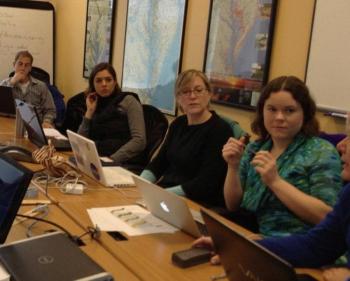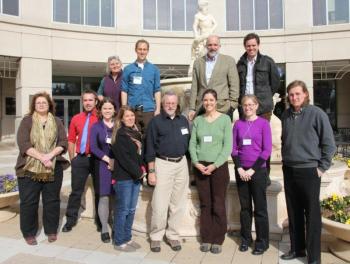Boothbay-Tasmania water project on tap
“I am so beyond excited,” Lauren Graham said last week.
What's she so jazzed about? How about the fact that Boothbay Region High School juniors and seniors in her ecology and oceanography classes will be participating in an international pilot water quality project: the USAUS-H20 (U.S.-Australia Virtual Environmental Partnership).
Graham had just returned from Annapolis, Maryland where she attended teaching workshops for the pilot project at the University of Maryland Center of Environmental Science February 24-26. She was joined by the seven other U.S. science teachers from the eight schools selected to participate in this historic pilot project.
Eight U.S. schools have been paired up with eight Australian schools based on similar latitudes and climates. All of the schools selected have strong environmental science departments and are technologically able to participate in the project. The other seven U.S. schools are in Vallejo, California; College Station, Texas; Centerville, Maryland; Bourg and New Orleans Louisiana, and Bolivia, North Carolina.
Boothbay, as was previously announced in late January, has been matched with a school in Tasmania. Graham found out early last week, at a two-day training session for the U.S. teachers in Annapolis, that Australian school is the Don College in Devonport.
“The main goals of the project are water quality and availability, and expanding technological literacy in the schools,” Graham said. “This is the 21st century and this project shows we can learn anywhere in the world. We have the opportunity to talk and learn with people in Australia.
“We get to compare our cultures and a place we have never been. If this takes off, and I think it will, it will change the way we teach and learn.”
The official website, www.usaus-h2o.org, the hub of this project, went live March 5. Two of the modules, or eight interactive Web programs requiring collection of data and information, are viewable for those who want to find out more about the pilot learning project. Graham said one module will be completed every two weeks.
The “official” Boothbay student team members are juniors Sophia Thayer, Hannah Brewer, Caleb Colby, Josiah Purin, Hannah Winslow, Benn Scully, Jude Alamo and Tori Schmid.
Seniors willing to work through the fall are Stephen Barter and Brady Duncan. Other participating seniors are Sam Schwehm, Alex Owen, Kam Markee, Jessie Vander, Sarah Caron, Sephanie Bryer and Mikayla McFetridge.
The project highlights the methods each area uses to provide clean water to each of the communities and the challenges they face in the future. There are eight components to the student water cycle project: the water source, how it is stored, treatment, distribution, usage, waste water treatment/disinfection, disposal and environmental impact.
Students will collect water samples, interpret results and present a scientific hypotheses. Students will compare and contrast methods in the other country, and grade their own community's water cycle, based on its environmental and ecological sustainability.
McFetridge is a first year student teacher in Graham's oceanography and ecology classes. She will be helping Graham teach the students how to take water samples. McFetridge participated in another study last year taking water samples for the West Boothbay Harbor Home Owner's Association from Campbell Stream, West Harbor Pond and other water sources. The samples were collected with the Boothbay Harbor Sewer District and tested in the district's lab.
“I'm a student teacher through a work study program with Mrs. Sirois. I'm torn between marine biology and being a Maine Game Warden,” McFetridge said. “But I'll need to know about water for either major. I like pairing with a school in a different country and comparing the water usage between us. I know a little about water usage now, but this will help me understand water and how to use it responsibly.”
Graham said the students were all just as jazzed as she is about the project. Oceanography and ecology student Brewer signed up for Graham's classes because she plans to pursue a career in marine biology after graduation in 2014.
“The whole thing is exciting; this is a completely new experience,” Brewer said. “We'll be using the modules on the website, collecting data, going on field trips to collect water samples and to visit the places that store and treat our water, and we will be meeting kids from another country and learning how we are different.”
Stephen Barter is one senior who will be continuing on with the study to the end. Barter plans to attend Southern Maine Community College and will “have plenty of time” to work on the project.
“I'm interested in science and this is a great opportunity,” Barter said about why he was participating. “Learning about water quality is a big deal that we will have. Learning about the problems, finding facts and possible solutions, and meeting people in another country is all pretty great!”
All participating students will become part of the International Exchange Alumni U.S. State Department's Alumni Network for all past and current U.S. government-sponsored exchange program participants (State Department definition). Graham said this designation could really help open some doors for them.
“The alumni exchange provides an opportunity for past participants to share their experience, knowledge, and ideas,” said Andrew Posner of the State Department. “Past participants have been honored with prestigious awards and have gone on to become leaders in their communities.”
There are more than 8 to 10 students for Graham's team because many are seniors working on a project that will continue on into mid-October; the Australian school year began this month (summer has just ended and many of the seniors involved now will be at college in the fall.
Graham expects the students will complete all six the modules by the time the U.S. school year ends, but the final project, the students' website, will be completed by mid-October. The website will depict their data and findings; tell their water story. There is the possibility that it will be presented in D.C., perhaps at the Australian Embassy with the Australian students Skyping in to present with their U.S. counterparts.
“We have not yet determined whether students will be able to present their results in Washington DC or not,” said Dr. Judith O'Neil of WMCES and primary project proposal author. “We are considering options, so wouldn't want to state that as such, at the moment. But they will all undoubtedly be presenting their results between countries, and to officials in both countries in an electronic forum such as webinars.”
Dr. Cynthia Heil, a senior research scientist at Bigelow Laboratory for Ocean Science, contributed to parts of the grant proposal for the project, “How Sustainable Is Your Local Water Cycle.” Dr. Judith O'Neil at UMCES was the lead author of the collaborative proposal. O'Neil said the collaboration also included input from her colleagues at the administering organization, the University of Maryland Center for Environmental Science, Drs. Simon Costanzo, Adrian Jones and William Dennison; and Dr. Andrew Campbell at Charles Darwin University, Darwin, Northern Territory, Australia.
Heil said the goal is to “promote responsible stewardship of water resources and to foster interest in environmental sciences.”
The 100K grant is from the Bureau of Educational and Cultural Affairs of the Department of State. There are three other similar projects being funded by the State Department going on between the U.S. and Russia, Afghanistan and the Near East.






























